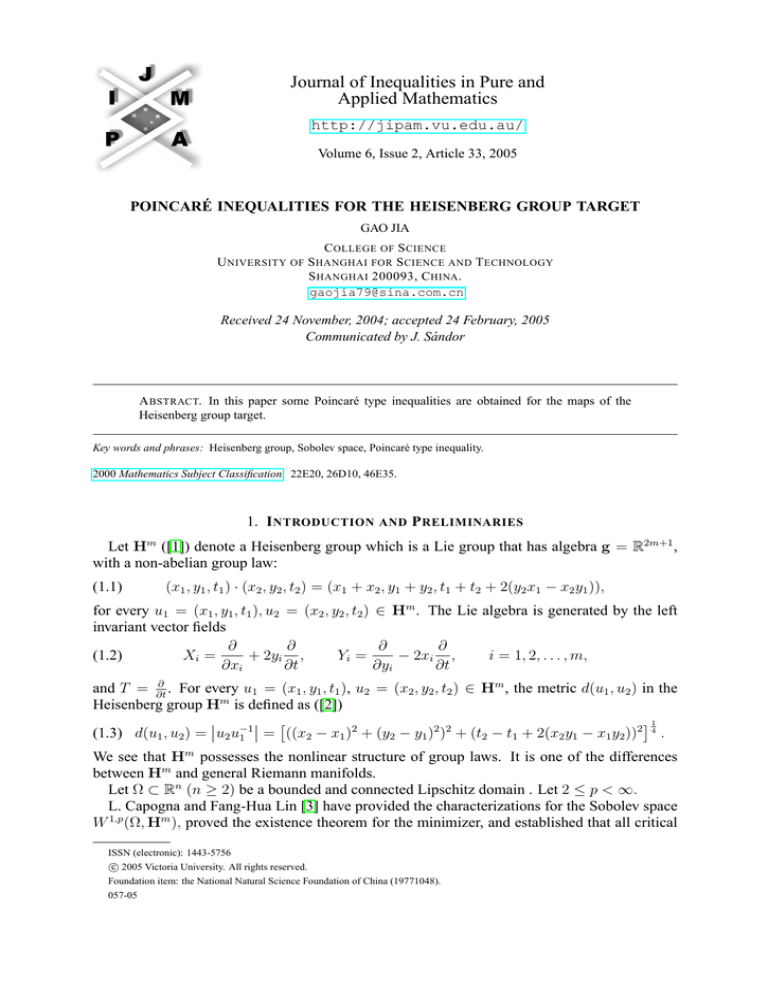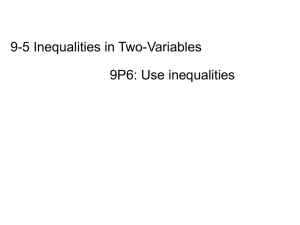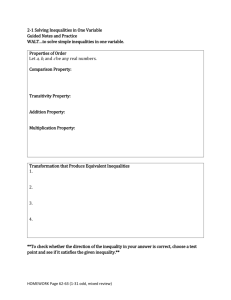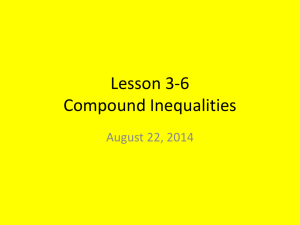
Journal of Inequalities in Pure and
Applied Mathematics
http://jipam.vu.edu.au/
Volume 6, Issue 2, Article 33, 2005
POINCARÉ INEQUALITIES FOR THE HEISENBERG GROUP TARGET
GAO JIA
C OLLEGE OF S CIENCE
U NIVERSITY OF S HANGHAI FOR S CIENCE AND T ECHNOLOGY
S HANGHAI 200093, C HINA .
gaojia79@sina.com.cn
Received 24 November, 2004; accepted 24 February, 2005
Communicated by J. Sándor
A BSTRACT. In this paper some Poincaré type inequalities are obtained for the maps of the
Heisenberg group target.
Key words and phrases: Heisenberg group, Sobolev space, Poincaré type inequality.
2000 Mathematics Subject Classification. 22E20, 26D10, 46E35.
1. I NTRODUCTION AND P RELIMINARIES
Let Hm ([1]) denote a Heisenberg group which is a Lie group that has algebra g = R2m+1 ,
with a non-abelian group law:
(1.1)
(x1 , y1 , t1 ) · (x2 , y2 , t2 ) = (x1 + x2 , y1 + y2 , t1 + t2 + 2(y2 x1 − x2 y1 )),
for every u1 = (x1 , y1 , t1 ), u2 = (x2 , y2 , t2 ) ∈ Hm . The Lie algebra is generated by the left
invariant vector fields
∂
∂
∂
∂
(1.2)
Xi =
+ 2yi ,
Yi =
− 2xi ,
i = 1, 2, . . . , m,
∂xi
∂t
∂yi
∂t
∂
. For every u1 = (x1 , y1 , t1 ), u2 = (x2 , y2 , t2 ) ∈ Hm , the metric d(u1 , u2 ) in the
and T = ∂t
Heisenberg group Hm is defined as ([2])
1
= ((x2 − x1 )2 + (y2 − y1 )2 )2 + (t2 − t1 + 2(x2 y1 − x1 y2 ))2 4 .
(1.3) d(u1 , u2 ) = u2 u−1
1
We see that Hm possesses the nonlinear structure of group laws. It is one of the differences
between Hm and general Riemann manifolds.
Let Ω ⊂ Rn (n ≥ 2) be a bounded and connected Lipschitz domain . Let 2 ≤ p < ∞.
L. Capogna and Fang-Hua Lin [3] have provided the characterizations for the Sobolev space
W 1,p (Ω, Hm ), proved the existence theorem for the minimizer, and established that all critical
ISSN (electronic): 1443-5756
c 2005 Victoria University. All rights reserved.
Foundation item: the National Natural Science Foundation of China (19771048).
057-05
2
G AO J IA
points for the energy are Lipschitz continuous in the 2-dimensional case. However, the higher
dimensional regularity problem is still open.
In this paper, we shall give some Poincaré type inequalities for the maps of the Heisenberg
group target. The statements of these results are similar to the ones in the classical case. However, since the metric possesses the nonlinear structure of the group law, we require the use of a
few techniques in the proofs for our Poincaré type inequalities.
Definition 1.1. Let 2 ≤ p < ∞. A function u = (z, t) : Ω → Hm is in Lp (Ω, Hm ) if for some
h0 ∈ Ω, one has
Z
(1.4)
(d(u(h), u(h0 ))p dh < ∞.
Ω
A function u = (z, t) : Ω → Hm is in the Sobolev space W 1,p (Ω, Hm ) if u ∈ Lp (Ω, Hm ) and
Z
(1.5)
Ep,Ω (u) =
sup
lim sup f (h)eu, (h)dh < ∞,
f ∈Cc (Ω),0≤f ≤1 →0
Ω
where
Z
eu, (h) =
|h−q|=
d(u(h), u(q))
p
dσ (q)
.
n−1
Ep,Ω (u) is called the p-energy of u on Ω.
Lemma 1.1. If u = (x, y, t) ∈ W 1,p (Ω, Hm ), then
∇t = 2(y∇x − x∇y) in
(1.6)
p
L 2 (Ω).
The maps satisfying (1.6) are called Legendrian maps.
Lemma 1.2. If u = (z, t) = (x, y, t) ∈ W 1,p (Ω, Hm ), then
Z
Ep,Ω (u) = ωn−1 |∇z|p (q)dq.
Ω
Lemma 1.1 and Lemma 1.2 are due to L. Capogna and Fang-Hua Lin [3].
Lemma 1.3 ([4]). (Cp −inequality) Let p > 0. Then for any ai ∈ R,
!p
n
n
X
X
|ai | ≤ Cp
|ai |p ,
i=1
i=1
where Cp = 1 if 0 < p < 1 and Cp = np−1 if p ≥ 1.
Lemma 1.4 ([5]). (Poincaré Inequality in the classical case) Let Ω be a bounded and connected
Lipschitz domain in Rm . Let p > 1. Then there exists a constant C depending only on Ω, m and
p, such that for every function u ∈ W 1,p (Ω, R), we have
Z
Z
p
|u(x) − λu | dx ≤ C
|∇u|p dx,
Ω
where λu =
1
|Ω|
R
Ω
Ω
u(x)dx.
J. Inequal. Pure and Appl. Math., 6(2) Art. 33, 2005
http://jipam.vu.edu.au/
P OINCARÉ I NEQUALITIES FOR THE H EISENBERG G ROUP TARGET
2. T HE P OINCARÉ T YPE I NEQUALITIES FOR
THE
3
H EISENBERG G ROUP TARGET
Theorem 2.1 (Poincaré type inequality). Let Ω be a bounded and connected Lipschitz domain
in Rn . Then there exists a constant C depending only on Ω, n, m and p, such that for every
function u = (x, y, t) = (z, t) ∈ W 1,p (Ω, Hm ),
Z
Z
p
(2.1)
(d(u(q), λu )) dq ≤ CΩ Ep,Ω (u) = CΩ |∇z|p (q)dq.
Ω
Ω
Here λu = (λx , λy , λt ) and λf =
1
|Ω|
R
Ω
f (q)dq.
Proof. Obviously, λu ∈ W 1,p (Ω, Hm ). From (1.3), using the Cp −inequality, we have
(d(u(q), λu ))p
p
= |z(q) − λz |4 + (t(q) − λt + 2(λx y(q) − λy x(q)))2 4
h
i
p
(2.2)
≤ Cp |x(q) − λx |p + |y(q) − λy |p + |t(q) − λt + 2(λx y(q) − λy x(q))| 2 ,
where Cp depends on p. By the Poincaré inequality in the classical case, noting that
2(λx y(q) − λy x(q)) = 2λx (y(q) − λy ) − 2λy (x(q) − λx ),
we obtain
Z
(d(u(q), λu ))p dq
Ω
Z p
p
p
≤ Cp
|x(q) − λx | + |y(q) − λy | + |t(q) − λt + 2(λx y(q) − λy x(q))| 2 dq
Ω
Z
Z
Z
p
p
p
≤ C1 |∇x| (q)dq + C2 |∇y| (q)dq + C3 |∇t + 2(λx ∇y − λy ∇x)| 2 dq.
Ω
Ω
Ω
By virtue of the Legendrian condition ∇t = 2(y∇x−x∇y), using the Hölder inequality, noting
that |∇x| ≤ |∇z| and |∇y| ≤ |∇z|, we have
Z
(d(u(q), λu ))p dq
Ω
Z
Z
p
≤ C1 |∇x| dq + C2 |∇y|p (q)
Ω
Ω
Z
p
p
+ C3 2 2
|∇y(x − λx ) − ∇x(y − λy )| 2 dq
Ω
Z
Z
p
≤ C1 |∇x| dq + C2 |∇y|p dq
Ω
Ω
Z
Z
p
p
p
p
2
2
2
2
+ C4
|∇x| |y − λy | dq + |∇y| |x − λx | dq
Ω
Z
≤ C1
p
Ω
Z
|∇x| dq + C2
p
Z
Z
p
Ω
|∇x| dq
12
|∇y| dq
Z
Z
Z
Z
p
p
p
p
≤ C1 |∇x| dq + C2 |∇y| dq + C6
|∇x| dq + |∇y| dq
Ω
Ω
Ω
Ω
Z
≤C
|∇z|p (q)dq,
Ω
|∇y| dq + C5
p
Ω
Ω
Ω
where C1 , C2 , C3 , C4 , C5 , C6 and C are dependent on Ω, n, m and p.
J. Inequal. Pure and Appl. Math., 6(2) Art. 33, 2005
http://jipam.vu.edu.au/
4
G AO J IA
Corollary 2.2. If u ∈ W 1,p (B(h0 , r), Hm ), then
Z
Z
p
p
p
(2.3)
(d(u(q), λu )) dq ≤ Cr Ep,B(h0 ,r) (u) = Cr
|∇z|p (q)dq.
B(h0 ,r)
B(h0 ,r)
Proof. Observe that
p
(d(u(q), λu ))p = |z(q) − λz |4 + (t(q) − λt + 2(λx y(q) − λy x(q)))2 4
i
h
p
≤ Cp |x(q) − λx |p + |y(q) − λy |p + |t(q) − λt + 2(λx y(q) − λy x(q))| 2 .
Here Cp depends on p. By the Poincaré inequality in the classical case, noting that
2(λx y(q) − λy x(q)) = 2λx (y(q) − λy ) − 2λy (x(q) − λx ),
we deduce
Z
(d(u(q), λu ))p dq
Br (h0 )
Z
p
p
p
(|x − λx | + |y − λy | + |t − λt + 2(λx y − λy x)| 2 )dq
≤ Cp
Br (h0 )
Z
Z
p
p
p
≤ C1 r
|∇x| (q)dq + C2 r
|∇y|p (q)dq
Br (h0 )
Br (h0 )
Z
p
p
|∇t + 2(λx ∇y − λy ∇x)| 2 dq.
+ C3 r 2
Br (h0 )
By virtue of the Legendrian condition ∇t = 2(y∇x − x∇y), using Hölder’s inequality, noting
that |∇x| ≤ |∇z| and |∇y| ≤ |∇z|, we can obtain
Z
(d(u(q), λu ))p dq
Br (h0 )
Z
Z
p
p
p
≤ C1 r
|∇x| (q)dq + C2 r
|∇y|p (q)dq
Br (h0 )
Br (h0 )
Z
p
p
+ C3 r 2
|∇y(q)(x(q) − λx ) − ∇x(q)(y(q) − λy )| 2 dq
Br (h0 )
Z
Z
p
p
p
≤ C1 r
|∇x| (q)dq + C2 r
|∇y|p (q)dq
Br (h0 )
Br (h0 )
+ C4 rp
Z
|∇x|p dq
Br (h0 )
≤ Crp
Z
Z
|∇y|p dq
12
Br (h0 )
|∇z|p (q)dq,
Ω
where C1 , C2 , C3 , C4 and C depend on Ω, n, m and p.
R EFERENCES
[1] D. CHRISTODOULOU, On the geometry and dynamics of crystalline continua, Ann. Inst. H.
Poincaré, 13 (1998), 335–358.
[2] A. VENERUSO, Hömander multipliers on the Heisenberg group, Monatsh. Math., 130 (2000), 231–
252.
[3] L. CAPOGNA AND FANG-HUA LIN, Legendrian energy minimizers, Part I: Heisenberg group
target, Calc. Var., 12 (2001), 145–171.
J. Inequal. Pure and Appl. Math., 6(2) Art. 33, 2005
http://jipam.vu.edu.au/
P OINCARÉ I NEQUALITIES FOR THE H EISENBERG G ROUP TARGET
5
[4] B.F. BECKENBACH AND R. BELLMAN, Inequalities, Springer-Verlag, 1961.
[5] W.P. ZIEMER, Weakly Differentiable Function, Springer-Verlag, New York, 1989.
[6] Z.Q. WANG
370.
AND
M. WLLEM, Singular minimization problems, J. Diff. Equa., 161 (2000), 307–
J. Inequal. Pure and Appl. Math., 6(2) Art. 33, 2005
http://jipam.vu.edu.au/









